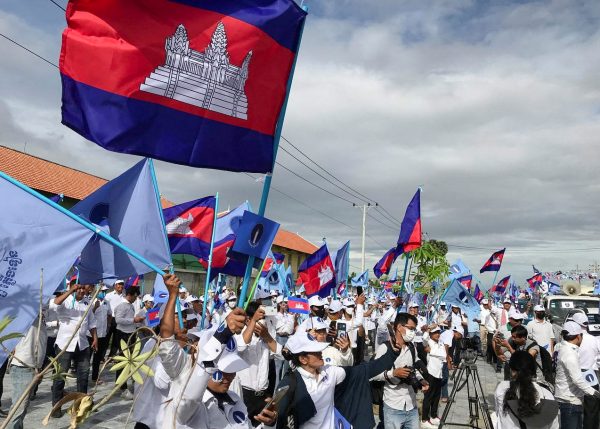The last elections were in 2017, when the Cambodian National Rescue Party (CNRP), a merger between the long-time opposition Sam Rainsy Party and the relatively new Human Rights Party, performed well. The election was followed by the government dissolving CNRP.
Cambodia’s democracy emerged from the Paris Peace Agreement in 1991 but has never been consolidated. Democratic institutions remain lacking in terms of their representation, independence and accountability. The state of human rights and liberties have fluctuated over the years.
The CPP has maintained its dominant role, mainly thanks to the sustained economic growth it has presided over, as well as intimidation and coercion. The CPP faced a credible challenger for the first time in 2013 when the CNRP received surprisingly strong support from voters and the CPP lost 20 of its parliamentary seats.
With the CNRP holding a significant number of seats in the National Assembly, the CPP were forced to concede on reforming the National Election Commission and promoting a ‘Culture of Dialogue’ as a behind-the-door platform for bipartisan dialogue.
2015 was a turning point. CNRP leader Sam Rainsy went into exile as Cambodian courts reimposed historical criminal charges against him. A new law on non-governmental organisations and associations was passed, constraining civic space for people to work on human rights and democracy-related issues. In October, two young CNRP Members of Parliament were beaten by pro-government protesters outside of the National Assembly.
In 2017, the CPP started unilaterally amending the Law on Political Parties, prohibiting criminals from leading political parties or featuring in campaign materials. As a result, Sam Rainsy resigned as CNRP president to spare the party from dissolving after his defamation conviction was revived in 2015. Kem Sokha became CNRP’s new president.
Despite repression and harassment, the CNRP decided to contest the 2017 local elections. The CNRP received 3.05 million votes, securing 489 commune chief positions and 5007 councillor seats across the country. The CPP won 3.54 million votes, winning 1156 commune chief positions and 6503 councillor seats.
CNRP’s surprisingly good performance signified a political threat for the CPP. Kem Sokha was charged with treason shortly after.
On 16 November 2017, the Supreme Court dissolved the CNRP and banned more than 100 party leaders from politics for five years. This disbandment resulted in the 55 National Assembly seats held by CNRP being taken over by the ruling CCP and the royalist National United Front for an Independent, Neutral, Peaceful and Cooperative Cambodia. Local councillors were replaced by CPP members. This move was fiercely criticised by the international community as non-democratic.
The 2018 national elections were organised without a main opposition and the CPP secured all 125 seats at the National Assembly, setting in motion a one-party state.
Now that the local elections are under way, there is hope for a return to multiparty politics. But these elections are overshadowed by recent conviction of CNRP’s senior and local members in a mass trial for ‘incitement’ and the ongoing trial of the former opposition party president Kem Sokha on treason charges.
The Candlelight Party, formerly the Sam Rainsy Party, assumes the role as the main contestant against the CPP. The Candlelight Party has managed to register its candidates in 1623 communes out of the total 1652 in spite of threats and intimidation against the party.
Whether these elections mark the return of democratic norms in Cambodia will depend on how well the main opposition performs. International observers, development partners, civil society representatives and the opposition party hope to see democratic processes reemerge as a platform for political participation and a vehicle for a peaceful transfer of power but no one is sure if that will be the case.
Much also hinges on the CPP’s response to the election results. Concerns are mounting about how the CPP will respond if the votes are in the opposition party’s favour. Will the Candlelight Party be dissolved the same way as the CNRP?
If history is any indication, it is hard to deny the possibility that politics as usual will emerge during and after Cambodia’s elections. Regardless of how well the Candlelight Party performs, CPP’s rule may prevail.
In the past, elections have been little more than the ruling party’s political tool of legitimacy. There is no sign to suggest that these ones will be any different.
Sreang Chheat is a PhD candidate at the University of Queensland. Sreang is interested in a wide range of topics related to democratic development, international development and Chinese aid and investment in Cambodia and Southeast Asia.

